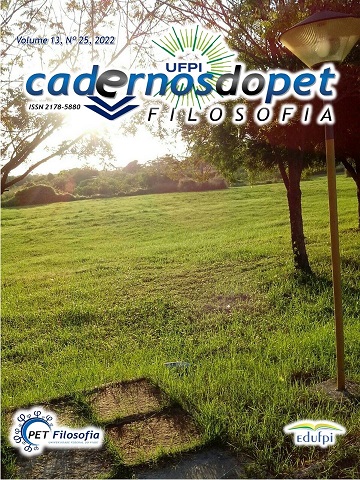O AUTOCUIDADO SOB UM ENFOQUE TRÁGICO:
ENTRE O PESSIMISMO SCHOPENHAUERIANO E "OS HOMENS OCOS" DE T.S. ELIOT
DOI:
https://doi.org/10.26694/cadpetfilo.v13i25.2922Keywords:
Schopenhauer. T.S. Eliot. Estética. Poesia. Tragédia.Abstract
The purpose of this essay is to tackle the concerns brought up by Schopenhauer in his aesthetics and demonstrate a necessary relationship between human activity and the work of art, as well as how the latter might reframe and "rescue" man from his suffering condition, at least for some time. In this regard, we will start with his examination of the concept of the Idea, which was inspired by Plato's mold as a depiction of the Essence – or the Will -, and how the knowledge through art is the only way to attain it. From now on, poetry, particularly in tragic forms, represents the greatest degree of knowledge, being capable of lifting man to the "Idea of humanity," as he refers to it, for reflecting more clearly the impetus of the Will, the foundation of the world. In this way, we will explore the tragic poem of T.S Eliot, The Hollow Men, through a Schopenhauerian lens to determine how he achieves the concept of humanity, in a symbiotic relationship between ethics and aesthetics, philosophy and poetry; the knowledge of mankind to take care of the self.
References
BARBOZA, Jair. Schopenhauer: A decifração do enigma do mundo. 2° ed. São Paulo: Editora Moderna, 1992.
ELIOT, T.S. Poesia. Tradução de Ivan Junqueira; apresentação Affonso Romano de Sant’Anna. Rio de Janeiro: Nova Fronteira, 2015.
__________. Notas para a definição de cultura. Tradução de Eduardo Wolf. São Paulo: É Realizações, 2011.
FRYE, Northrop. T.S. Eliot. Tradução Elide-lela Valarini. Rio de Janeiro: Imago Ed. 1998.
JUNQUEIRA, Ivan. Baudelaire, Eliot, Dylan Thomas: três visões da modernidade. Rio de Janeiro: Record, 2000.
KIRK, Russell. A Era de T.S. Eliot: A Imaginação Moral do Século XX. Tradução de Márcia Xavier de Brito. São Paulo: É realizações, 2011.
LAVELLE, Louis. O erro de Narciso. Tradução de Paulo Neves. São Paulo: É Realizações, 2012.
SAFRANSKI, Rüdiger. Schopenhauer e os anos mais selvagens da filosofia. São Paulo: Geração Editorial, 2018.
SANTOS, Alcides Cardoso. Desolação e esperança em Os homens ocos, de T.S. Eliot. RevLet – Revista virtual de letras, Goiás, v. 12, nº 02 - ago/dez, 2020.
SCHOPENHAUER, Arthur. O Mundo como Vontade e como Representação, 1º tomo. Tradução, apresentação, notas e índices de Jair Barboza. São Paulo: Editora UNESP, 2005.
______________________. O Mundo como Vontade e como Representação, 1º tomo. Tradução, apresentação, notas e índices de Jair Barboza. 2° ed. São Paulo: Editora UNESP, 2013.
_______________. Metafísica do Belo. Tradução, apresentação, notas e índices de Jair Barboza. São Paulo: Editora UNESP, 2003.
_______________. Sobre a quadrúplice raiz e o princípio de razão suficiente: Uma dissertação filosófica. Tradução: Oswaldo Giacoia Junior e Gabriel Valladão Silva. São Paulo: Editora da Unicamp, 2019.











